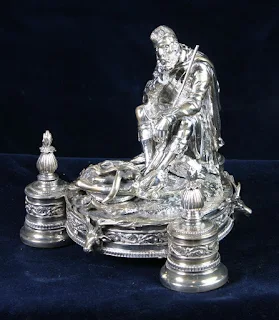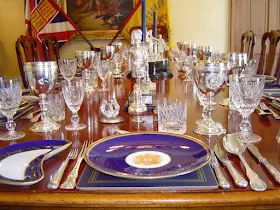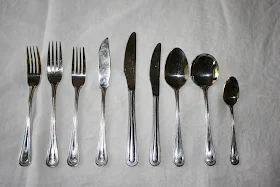As fellow Scots know far
better than I, one of the signal events of Roberts Burn’s Night is the "Address
to the Haggis", a poem authored by Burns in 1786, and recited at every Burn’s Night
ever since. It is celebrated on January 25 in commemoration of his birth on
that day in 1759.
The decade of 2000 to 2010
in my personal opinion were truly the halcyon years of e-Bay. During that
period I was able to find and successfully bid on some unique pieces of Scottish
military history.
One of the items was a set
of regimental cutlery (stainless steel flatware) most probably from the officer’s
mess of the 92nd Gordon Highlanders. An alternate theory would be that it came
from either the Warrant Officer’s or Sergeant’s Mess. The rationale for this being that it was placed on e-Bay by a former serving bagpiper (precise rank unknown) of the regiment, who resided in Northern Ireland at the time of the auction. It consists of 6 place
settings (9 pieces each), less a missing sweet spoon (replaced in correct pattern, but without regimental
marking), with a mustard (covered) and salt/condiment dish which each contain
indigo blue glass inserts and small serving spoons, and 2 condiment spoons of
different size. The two condiment dishes are engraved with the cipher ERII.
Manufactured and marked by Oneida Stainless in believed to be the Ardmore pattern (now retired "beaded pattern"), each of the pieces is die stamped
with an insigne identical to the regiment’s contemporary service dress sporran
badge with king’s crown (George VI - pre1953). The condiment spoons are each
marked 75 S.M, with Mappin & Webb Princesplate and hallmarked on the backs.
All are contained in a dark blue velvet lined mahogany canteen (silverware chest),
which can accommodate 12 place settings.
With most profuse apologies to the "President of the Mess", and the rationalization that it provides an exercise for eagle-eyed observers, what is incorrect in the following place setting? In due course the error will be corrected with a new image.
With most profuse apologies to the "President of the Mess", and the rationalization that it provides an exercise for eagle-eyed observers, what is incorrect in the following place setting? In due course the error will be corrected with a new image.
Each complete place setting
is allegedly comprised of the following, per the original auction description; a fish fork, fork, knife, fish knife, side
knife, soup spoon, sweet spoon, sweet fork and a teaspoon. Personally could not initially discern any difference between a fish fork and a sweet fork. They both looked like salad forks to me. However, on very close examination the one set of forks has a small but distinct notch on either side between the handle and tines of the fork. I believe these to be fish forks (but not certain).
As promised, to the best of my knowledge, the following would be a correct setting of the nine pieces at each place at the table. From left to right; fish fork, fork, sweet fork, teaspoon (at top of plate), side knife, knife, fish knife, sweet spoon, and soup spoon. The fish knife was incorrectly placed in the previous setting.
As promised, to the best of my knowledge, the following would be a correct setting of the nine pieces at each place at the table. From left to right; fish fork, fork, sweet fork, teaspoon (at top of plate), side knife, knife, fish knife, sweet spoon, and soup spoon. The fish knife was incorrectly placed in the previous setting.
After 200 year’s service to
the Crown, like all British Army regiments, there was a significant acquisition
of regimental silver. A major amount of this now being on display in the Silver
Room at the Gordons' Regimental Museum in Aberdeen, Scotland. Having had the
opportunity of a personal visit to the museum in the late summer of 2006, I’m
certain that a sufficient quantity of sterling silver flatware exists to fully
set the table(s) for a regimental dining in, or other special occasions. The dining ins included "Inspection Nights", "Band Night", "Regimental Guest Nights" and "Guest Nights". Special occasions would have included; Dragai Day, Waterloo Dinner, Raising of the Regiment, Robert
Burns Night, and visits from the regiment's Cornel-in-Chief (Charles, Prince of Wales). Dining in Mess "is a Parade" with compulsory attendance.
As an adjunct and admittedly an anachronism, the following
article published in March 1919, offers an insight as to the origins and
evolution of the Mess-Rooms of all the Regiments of the British Army. It is
provided for possible reader interest, based upon the established popularity of
the recent award-winning British television series Downton Abbey.
It’s also insightful that most of these customs and traditions remain in use with not only the armed forces of the former British Commonwealth, but the armed forces of the United States of America, particularly the United States Marine Corps.
It’s also insightful that most of these customs and traditions remain in use with not only the armed forces of the former British Commonwealth, but the armed forces of the United States of America, particularly the United States Marine Corps.
Finally for the enjoyment of fellow Scots, throughout the world, and the edification, and more than probable boredom of everyone else, what follows is the original and translation in English of "Address to a Haggis".
Great chieftain o the puddin'-race!
Aboon them a' ye tak your place,
Painch, tripe, or thairm:
Weel are ye worthy o' a grace
As lang's my arm.
The groaning trencher there ye fill,
Your hurdies like a distant hill,
Your pin wad help to mend a mill
In time o need,
While thro your pores the dews distil
Like amber bead.
His knife see rustic Labour dight,
An cut you up wi ready slight,
Trenching your gushing entrails bright,
Like onie ditch;
And then, O what a glorious sight,
Warm-reekin, rich!
Then, horn for horn, they stretch an strive:
Deil tak the hindmost, on they drive,
Till a' their weel-swall'd kytes belyve
Are bent like drums;
The auld Guidman, maist like to rive,
'Bethankit' hums.
Is there that owre his French ragout,
Or olio that wad staw a sow,
Or fricassee wad mak her spew
Wi perfect scunner,
Looks down wi sneering, scornfu view
On sic a dinner?
Poor devil! see him owre his trash,
As feckless as a wither'd rash,
His spindle shank a guid whip-lash,
His nieve a nit;
Thro bloody flood or field to dash,
O how unfit!
But mark the Rustic, haggis-fed,
The trembling earth resounds his tread,
Clap in his walie nieve a blade,
He'll make it whissle;
An legs an arms, an heads will sned,
Like taps o thrissle.
Ye Pow'rs, wha mak mankind your care,
And dish them out their bill o fare,
Auld Scotland wants nae skinking ware
That jaups in luggies:
But, if ye wish her gratefu prayer,
Gie her a Haggis
(Translation)
Fair and full is your honest, jolly face,
Great chieftain of the sausage race!
Above them all you take your place,
Stomach, tripe, or intestines:
Well are you worthy of a grace
As long as my arm.
The groaning trencher there you fill,
Your buttocks like a distant hill,
Your pin would help to mend a mill
In time of need,
While through your pores the dews distill
Like amber bead.
His knife see rustic Labour wipe,
And cut you up with ready slight,
Trenching your gushing entrails bright,
Like any ditch;
And then, O what a glorious sight,
Warm steaming, rich!
Then spoon for spoon, the stretch and strive:
Devil take the hindmost, on they drive,
Till all their well swollen bellies by-and-by
Are bent like drums;
Then old head of the table, most like to burst,
'The grace!' hums.
Is there that over his French ragout,
Or olio that would sicken a sow,
Or fricassee would make her vomit
With perfect disgust,
Looks down with sneering, scornful view
On such a dinner?
Poor devil! see him over his trash,
As feeble as a withered rush,
His thin legs a good whip-lash,
His fist a nut;
Through bloody flood or field to dash,
O how unfit.
But mark the Rustic, haggis-fed,
The trembling earth resounds his tread,
Clap in his ample fist a blade,
He'll make it whistle;
And legs, and arms, and heads will cut off
Like the heads of thistles.
You powers, who make mankind your care,
And dish them out their bill of fare,
Old Scotland wants no watery stuff,
That splashes in small wooden dishes;
But if you wish her grateful prayer,
Give her [Scotland] a Haggis!


















No comments:
Post a Comment